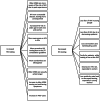Understanding the effect of an educational intervention to optimize HIV testing strategies in primary care in Amsterdam - results of a mixed-methods study
- PMID: 37777732
- PMCID: PMC10541686
- DOI: 10.1186/s12875-023-02161-y
Understanding the effect of an educational intervention to optimize HIV testing strategies in primary care in Amsterdam - results of a mixed-methods study
Abstract
Background: In the Netherlands, general practitioners (GPs) play a key role in provider-initiated HIV testing, but opportunities for timely diagnosis are regularly missed. We implemented an educational intervention to improve HIV testing by GPs from 2015 to 2020, and observed a 7% increase in testing in an evaluation using laboratory data. The objective for the current study was to gain a deeper understanding of whether and how practices and perceptions of GPs' HIV/sexually transmitted infection (STI) testing behaviour changed following the intervention.
Methods: We performed a mixed-methods study using questionnaires and semi-structured interviews to assess self-reported changes in HIV/STI testing by participating GPs. Questionnaires were completed by participants at the end of the final educational sessions from 2017 through 2020, and participating GPs were interviewed from January through March 2020. Questionnaire data were analysed descriptively, and open question responses were categorised thematically. Interview data were analysed following thematic analysis methods.
Results: In total, 101/103 participants completed questionnaires. Of 65 participants that were included in analyses on the self-reported effect of the programme, forty-seven (72%) reported it had changed their HIV/STI testing, including improved STI consultations, adherence to the STI consultation guideline, more proactive HIV testing, and more extragenital STI testing. Patients' risk factors, patients' requests and costs were most important in selecting STI tests ordered. Eight participants were interviewed and 15 themes on improved testing were identified, including improved HIV risk-assessment, more proactive testing for HIV/STI, more focus on HIV indicator conditions and extragenital STI testing, and tools to address HIV during consultations. However, several persistent barriers for optimal HIV/STI testing by GPs were identified, including HIV-related stigma and low perceived risk.
Conclusions: Most GPs reported improved HIV/STI knowledge, attitude and testing, but there was a discrepancy between reported changes in HIV testing and observed increases using laboratory data. Our findings highlight challenges in implementation of effective interventions, and in their evaluation. Lessons learned from this intervention may inform follow-up initiatives to keep GPs actively engaged in HIV testing and care, on our way to zero new HIV infections.
Keywords: General practitioner; HIV testing; Medical education; Mixed-methods; Primary care; Sexually transmitted infections.
© 2023. BioMed Central Ltd., part of Springer Nature.
Conflict of interest statement
The authors declare no competing interests.
Figures


References
-
- European Centre for Disease Prevention and Control/WHO Regional Office for Europe. HIV/AIDS surveillance in Europe 2022 - 2021 data. Stockholm; 2022. Available from: https://www.ecdc.europa.eu/sites/default/files/documents/2022-Annual_HIV.... Last accessed: 20 Jun 2023.
-
- Rodger AJ, Cambiano V, Bruun T, et al. Risk of HIV transmission through condomless sex in serodifferent gay couples with the HIV-positive partner taking suppressive antiretroviral therapy (PARTNER): final results of a multicentre, prospective, observational study. Lancet. 2019;393(10189):2428–2438. doi: 10.1016/S0140-6736(19)30418-0. - DOI - PMC - PubMed
-
- Staritsky L, van Aar F, Visser M, et al. Sexually transmitted infections in the Netherlands in 2019. Rijksinstituut voor Volksgezondheid en Milieu (RIVM) 2020;Report number 2020–0052.
Publication types
MeSH terms
LinkOut - more resources
Full Text Sources
Medical
